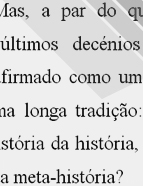

................................
However, in the wake of the French invasions, Portugal entered a period of military conflict and great political instability, spanning from the liberal revolution to the Patuleia (civil war). It would only be in the 1840s that the renewal of historiography would materialise, informed by the knowledge of the most advanced European historiographies of the time. By then, a profound transformation had occurred in the very writing of history across literate Europe: history had come to centre itself on a new protagonist and referential identity—the nation.
It was in the initial stages of this unstable period of constructing the liberal state that Alexandre Herculano published a series of articles on ancient Portuguese chroniclers from the 15th and 16th centuries in O Panorama . These articles were brief intellectual biographies in which he sought to characterise the chroniclers’ works within the political contexts of their times. The historian viewed the liberal revolution as a necessary shift from historical tradition, though he acknowledged the risk it posed of severing social memory. This explains his attention to the memory constructed by the chroniclers and his critique of the mythical history fuelled by myths on the origin of Portugal (such as the identification of the Portuguese with the Lusitanians, the Miracle of Ourique, and the Cortes of Lamego). Of particular note is what Herculano most valued in Fernão Lopes, the great late-medieval Portuguese chronicler : 1) t he poetic and dramatic nature of his narratives, which successfully evoked the past in its entirety (interestingly, this perspective came from the man who would later advocate for the separation of history from literature) ; 2) t he fact that Lopes’s chronicles not only captured the history of a generation, but also depicted the lives of various social groups and the movements of the masses. In Herculano 's view, to some extent Fernão Lopes prefigured the type of national historian Herculano himself aspired to be in the 19th century. Conversely, he categorised the works of other chroniclers as “courtly literature,” which, he considered amounted to little more than the apologetic biographies of princes, as was the case with Rui de Pina. From his liberal perspective, influenced by Tocqueville’s municipalism, Herculano attributed the emergence of such royal biographies to the absolute state and the process of monarchical centralisation that had been underway since the late 15th century. And he wondered, “What other form could history take in an era when the social organisation had absorbed the people, the nobility, and even the clergy beneath the throne of the monarch?” (" Historiadores portugueses " [Portuguese Historians], Opúsculos IV [Opuscules IV] undated [1840], p. 183). His emphasis on the role of the individual in history (evident in his História de Portugal [History of Portugal], 1846–53) and his liberal and romantic ideals did not prevent him from situating historiography within a broader political and social context. In his view, ignorance of historical memory was a symptom of social decay, making it essential to bring the works of ancient chroniclers to light.
